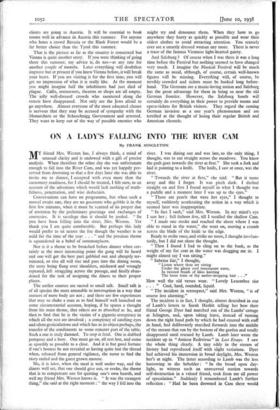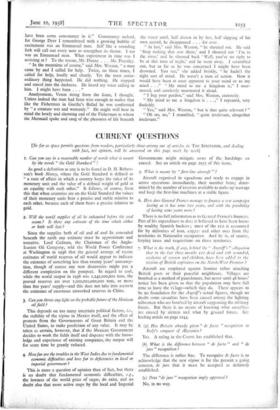ON A LADY'S FALLING INTO THE RIVER CAM
By FRANK SINGLETON
MY friend Mrs. Weston has, I always think, a mind of unusual clarity and is endowed with a gift of precise analysis. When therefore the other day she was unfortunate enough to fall into the River Cam, and was yet happily pre- served from drowning so that a few days later she was able to invite me to dinner, I accepted with even more than the customary readiness, for I should be treated, I felt sure, to an account of the adventure which would lack nothing of truth- fulness, penetration, and wise deduction.
Conversations can have no programme, but when such a morsel awaits one, they are no gourmets who gobble it in the first few minutes, when it must be scanted of its proper due of attention by the preliminary greetings and exchanges of courtesies. It is sacrilege that it should be jostled. " So you have been falling into the river, Mrs. Weston. Yes thank you I am quite comfortable. But perhaps this lady would prefer to sit nearer the fire though the weather is so mild for the time of the year . . . " and the precious theme is squandered in a babel of commonplaces.
Nor is it a theme to be broached before dinner when cer- tainly at the most interesting point the gong will be heard and one will get the best part gabbled out and abruptly ter- minated, or else all will rise and pass into the dining room, the story being flung over shoulders, misheard and wrongly repeated, left straggling across the passage, and finally aban- doned for the task of assigning the diners to their proper places.
The earlier courses are sacred to small talk. Small talk is of all species the most amenable to interruption in a way that matters of more body are not ; and there are few experiences that may so shake a man as to find himself well launched on some circumstantial account, hoping, if he spares a thought from his main theme, that others are as absorbed as he, and then to find that he is the victim of a gigantic conspiracy in which all the rest are involved ; a conspiracy of catching eyes and silent gesticulations and which has as its object perhaps, the transfer of the condiments to some remoter part of the table. Such a one is truly damned. To stop is fatal. One is dubbed pompous and a bore. One must go on, all zest lost, and come as speedily as possible to a close. And it is but good fortune if one's hostess be not revealed as having quite lost the thread when, released from general vigilance, she turns to find the story ended and the guest grown morose.
No, it is later, when the meal is well under way, and the diners well set, that one should give out, or evoke, the theme that is to compensate one for quitting one's own hearth, and well my friend Mrs. Weston knows it. " It was the strangest thing," she said at the right moment : " the way I fell into the river. I was dining out and was late, so the only thing, I thought, was to cut straight across the meadows. You know the path goes towards the river at first." She took a fork and laid it pointing to a knife. The knife, I saw at once, was the river.
" Towards the river at first," she said. " But it turns away and this I forgot. It was pitch dark. I dashed straight on and first I found myself in what I thought was a puddle and a moment later I was up to the eyes."
" Those are pearls that were her eyes," I thought to myself; ruthlessly accelerating the action in a way which it seemed later was inappropriate.
" In fact I sank," said Mrs. Weston. In my mind's eye I saw her ; full fathom five, till I recalled the shallow Cam.
" I made one stroke and reached the shore where I was able to stand in the water," she went on, moving a crumb across the blade of the knife to the edge.
Ready to strike once, and strike no more, I thought involun- tarily, but I did not share the thought.
" Then I found I had to cling on to the bank, as the weight of my fur coat in the water was dragging me in. I might almost say I was sitting."
" Sabrina fair," I thought, _ " Listen where thou art sitting
Under the glassy cool translucent wave, In twisted braids of lilies knitting The loose train of thy amber-dropping hair . . ."
How well the old verses wear. " Lovely Leucothea rise ; . . " Cool, hard, rounded, liquid.
" The incident in retrospect," said Mrs. Weston, " is of course less alarming."
The incident is in fact, I thought, almost described in one of Lamb's letters to Sarah Hazlitt telling her how their friend George Dyer had marched out of the Lambs' cottage at Islington, and, upon taking leave, instead of turning down the right hand path by which he had entered with staff in hand, had deliberately marched forwards into the middle of the stream that ran by the bottom of the garden and totally disappeared until rescued by Lamb Lamb later wrote the incident up in " Amicus Redivivus " in Last Essays. I saw the whole thing clearly. A tiny eddy in the stream of history had reproduced itself with slight variations. Dyer had achieved his immersion in broad daylight, Mrs. Weston her's at night. The latter according to Lamb was the less harrowing to the beholder : " In the broad open day- light, to witness such an unreserved motion towards self-destruction in a valued friend, took from me all power of speculation." Suddenly I remembered Lamb's further reflection : " Had he been drowned in Cam there would have been some consonancy in it." Consonancy indeed, for George Dyer I remembered with a growing bubble of excitement was an Emmanuel man. Self like a sounding fork will call out every note to strengthen its theme. I too was an Emmanuel man. What experiment in time was I assisting at ? To the rescue, Mr. Dunne . . . Mr. Priestley. " In the meantime of course," said Mrs. Weston, " a man came by and I called for help. Twice, no three times, I called for help, loudly and clearly. Yet the most extra- ordinary thing happened. He did nothing. He stopped and stared into the darkness. He heard my voice calling to him. I might have been . . . "
Anadyomene, Venus rising from the foam, I thought. Unless indeed the man had been wise enough to realise that like the Fisherman in Goethe's Ballad he was confronted by " a creature wet and womanly." He might well bear in mind the lovely and alarming end of the Fisherman to whom the Mermaid spoke and sang of the pleasures of life beneath the water until, half drawn in by her, half slipping of his own accord, he disappeared . . . for ever.
" At last," said Mrs. Weston, " he shouted out. He said Stop making that row there,' and I shouted out ' I'm in the river,' and he shouted back Well, you've no right to be at this time of night,' and he went away. I scrambled out, but as far as he was concerned I might have been drowned. You see," she added briskly, " he hadn't the right sort of mind. He wasn't a man of action. Now it would have been at once apparent to your mind or to my mind . . ." " My mind to me a kingdom is," I mur- mured, and carelessly murmured it aloud.
" I beg your pardon," said Mrs. Weston, curiously.
" My mind to me a kingdom is . . .," I repeated, very foolishly.
" Yes," said Mrs. Weston, " but is that quite relevant ? " " Oh no, no," I mumbled, " quite irrelevant, altogether irrelevant."











































 Previous page
Previous page